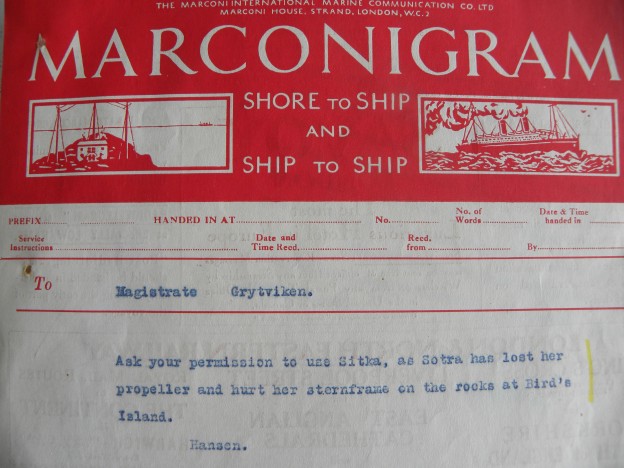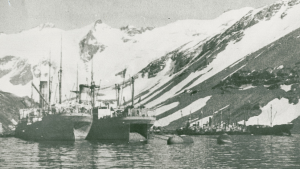After the recent BBC whaling documentary produced by KeoFilms / KeoNorth– entitled ‘Britain’s whale hunters: the untold story’ – a spike in enquiries about the archive of the former whaling firm Christian Salvesen & Company of Leith was anticipated. To meet this, some light work has been carried out on the archive, largely to ease the difficulties sometimes encountered when handling the collection. Slightly more expanded listing of the files – beyond those supplied by the Company some decades ago – has revealed interesting aspects of life down in the far Southern Ocean, in the Falkland Islands and on South Georgia.
While the television documentary was very descriptive of how dangerous a whaler’s life could be, both at sea and on the ‘flensing plan’, it is clear that off-duty activities could be dangerous too, if not fatal. A report from Hansen to the Magistrate at Grytviken, South Georgia, relates how two sailors from the whaler ‘Swona’ had gone to the vessel’s powder magazine and taken 10 kilos of gunpowder and a 5 pound tin of ‘granatepowder’. They had then gone ashore in order to make fireworks, putting the 10 kilos of powder into a cast-iron pipe and lighting the powder. One of the sailors was killed when this firework (we would call it a pipe-bomb nowadays) exploded.
Whale-catching vessels could also be ‘hurt’ as shown by this marconigram (wireless telegraph message) from Hansen, again, to the Magistrate at Grytviken. The whale-catcher ‘Sotra’ had lost her propeller and ‘hurt her sternframe’.
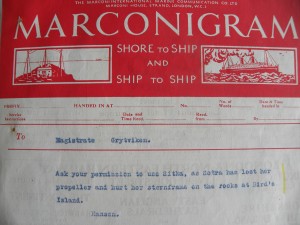
Wireless telegraph message sent by Leganger H. Hansen (Salvesen manager, Leith Harbour, South Georgia, between 1916 and 1937)
Then there was the difficulty of sending provisions to the whaling stations – inferior goods were often a problem. A letter from the Salvesen offices in Glasgow, 3 December 1912, to a local city supplier refers to the peas supplied to the Company. The Manager of the Whaling Station at South Georgia had written that the peas were of ‘such a bad quality that it is impossible to get them boiled down so as to make pea-soup’.
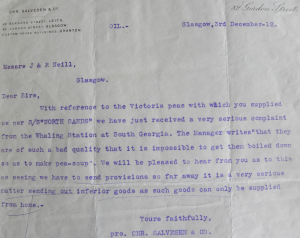
Letter, 3 December 1912, from the Salvesen office in Glasgow to a local city supplier, after a complaint from a Manager in South Georgia
Another file shows that in December 1926, the Magistrate at Grytviken granted permission to Salvesen on behalf of the Danish Government to take a selection of 75 penguins for exhibition purposes in Denmark. The permit was conditional upon half of these penguins then being delivered to London Zoo afterwards.
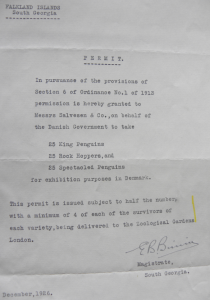
Letter, 1926, from the Magistrate in Grytviken, South Georgia, granting permission to take several dozen penguins to Denmark for exhibition
In spite of the hard life of the whaler, there were always stowaways willing to bring change to their lives either in the Southern Ocean or in the other parts of the world fished and hunted by Salvesen. This is proved in a 1933 letter from Leganger H. Hansen (the Salvesen manager of the Leith Harbour whaling station, South Georgia, between 1916 and 1937, and almost certainly the same Hansen mentioned in the brief glimpses of whaling life described above). In the letter, Hansen tells how the whale-factory ship ‘Salvestria’ had acquired three stowaways and that they could possibly be ‘landed at Dover’. He did not ‘wish any stowaways to receive either pay or part’, and he believed ‘it best that such men should be transferred to the ‘Coronda’ and placed under the command of Captain Begg, who has assured us that he will make them work’. There was a possibility of stowaways on other Salvesen vessels too – ‘Sourabaya’ and ‘New Sevilla’.
Completely unconnected with the Argentine name for the Islands – Las Malvinas – the ‘Malvina Stores’ was a thriving business on the Falkland Islands in the early years of the 20th century. In 1909, in Stanley, the principal town, ‘Malvina Stores’ sold everything that might be needed, from corsets, cookery books, spare pants and under clothing, fingering yarn, ear syringes, toilet covers, nuns veiling, and bronchitis kettles.
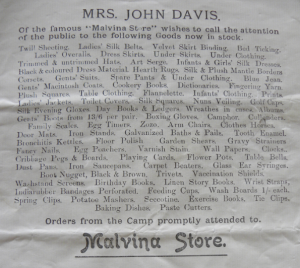
Advertisement for ‘Malvina Store’, Stanley, Falkland Islands, from ‘The Falkland Islands Magazine and Church Paper’ No.1. Vol.XXI. May 1909
Several sections of the archive contain printed matter, including government ordinances. At the opening of 20th century, in an ‘Ordinance relating to Aliens, Destitute Immigrants, and to the Naturalization of Foreign Subjects’ dated 27 July 1900, William Grey-Wilson, the Governor and Commander-in-Chief, advised that several South Americans including Uruguayans and an Argentinean had taken the oath of allegiance.
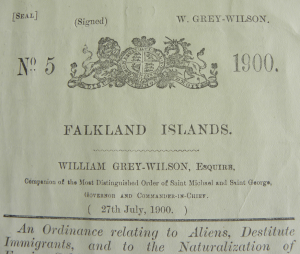
From ‘An Ordinance relating to Aliens, Destitute Immigrants, and to the Naturalization of Foreign Subjects’, 27 July 1900
What a difference a century can make !
Graeme D. Eddie, Assistant Librarian Archives and Manuscripts, Centre for Research Collections
